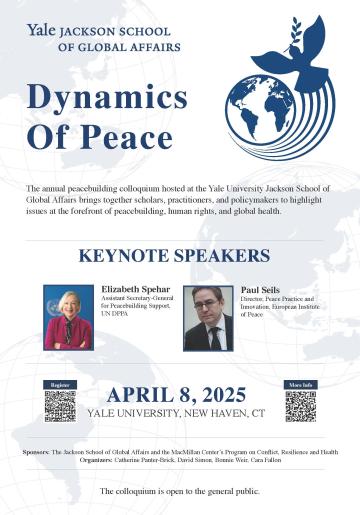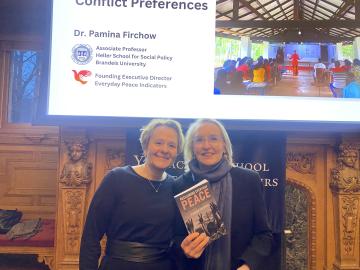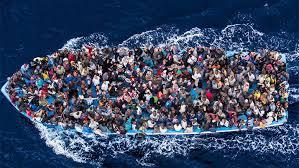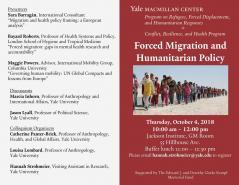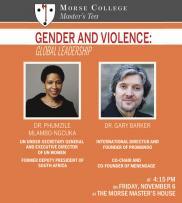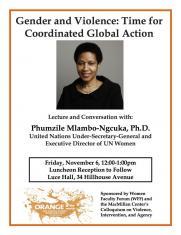Events
Dynamics of Peace
April 8, 2025
Register and find more information here.
The Jackson School’s Peacebuilding Initiative will host its 2025 spring colloquium, “Dynamics of Peace,” a daylong conference held at Yale University.
Participants include peace and conflict experts from the United Nations Department of Political Affairs, the European Institute of Peace, the Institute for Economics & Peace, The Carter Center’s Conflict Resolution Program, and Yale University, as well as practitioners and scholars from across the world. Participants will present discuss key innovations and key insights on intergenerational peace-building.
The event is open to the Yale community and the general public, but space is limited and advance registration is required.
Everyday Peace Indicators: Understanding Aid Paradigms and Post-Conflict Preferences
January 21, 2025
Post event report here
Pamina Firchow is associate professor at Brandeis University’s Heller School for Social Policy and Management and the founding executive director of Everyday Peace Indicators, a nonprofit organization dedicated to research and evaluation. She will discuss how Everyday Peace Indicators (EPI) differ from traditional measurement approaches in peacebuilding and provide a brief overview of EPI data collection methods.
Firchow will delve into the many ways EPI can be applied: as a research methodology, a tool for measuring peacebuilding outcomes, a policy development resource, an impact evaluation framework, and a catalyst for community engagement on key local issues. The discussion will also include examples of EPI in practice, with a particular focus on her forthcoming article in World Development, “After War Ends: Understanding Aid Paradigms and Post-Conflict Preferences.”
In her research, Firchow focuses on the international accompaniment of communities affected by mass violence and the localization of international development and peacebuilding aid. She has published extensively on participatory approaches to the design, measurement, and evaluation of transitional justice, reconciliation, and peacebuilding initiatives in leading peer-reviewed journals. Her award-winning book, “Reclaiming Everyday Peace: Local Voices in Measurement and Evaluation after War,” exemplifies her innovative work in this field.
In addition to her academic and nonprofit leadership roles, Firchow serves as an advisor to several international organizations, including USIP, USAID, the World Bank, and the United Nations. Since 1999, she has worked as a scholar-practitioner for non-governmental organizations and academic institutions on finding ways to use local knowledge to improve the way we respond to conflict. Since 1999, she has served as a scholar-practitioner with non-governmental organizations and universities, focused on harnessing local knowledge to improve how we respond to violent conflicts. She served as a USIP Senior Jennings Randolph Fellow in 2016 and a Fulbright Fellow in Bogotá, Colombia, in 2020.
Strategies for Sustainable Peacebuilding: Implementation and Policy
November 14-15, 2022
Scholars, practitioners, and policy-makers will speak about implementation challenges to designing resilient peace agreements, as well as engaged monitoring and fostering public participation when integrating peace agreements into policy.
Colloquium on Social Justice, Solidarity, and Forced Migration
March 7, 2019
This Colloquium was a forum to discuss how religion and social justice intersect with refugee experiences and mesh with broader socio-political dynamics.
Reflections on the workshop are available in the form of podcasts. (Read full colloquium report)
Colloquium on Forced Migration and Humanitarian Policy
October 4, 2018
This Colloquium focused on migration issues in Europe. Speakers reflected on challenges to policy and shared their thinking regarding how to move forward in the years to come
Health and Humanitarian Action: Bridging Gaps between Research and Practice
April 13, 2018
This workshop brought together scholars and practitioners working on health in humanitarian crises. Presenters specifically discussed ways to foster effective relationships.
Early Child Development and Peacebuilding Consortium
June 10-11, 2015
A conference and stakeholder meeting was convened in Istanbul, Turkey. This initiative was hosted by UNICEF and the Yale-AÇEV Partnership to create a platform for global communication and specific partnerships on violence prevention and peacebuilding.
Men and Families - Parenting Interventions in Conflict Settings
October 28, 2014
This workshop was convened to discuss research and project evaluations, as well as future collaborative work, between scholars, practitioners, and policy-makers.
Youth, Conflict & Governance in Africa
February 28 & March 1, 2014
This workshop was convened to assess how young people are currently changing the nature of governance in Africa. It integrated analysis across anthropology, media studies and communication, politics and economics, fields that have been working largely in parallel rather than in collaboration.
Violence, Intervention & Agency Colloquium
6 November 2015
This Colloquium focused on gender and violence and global action.
